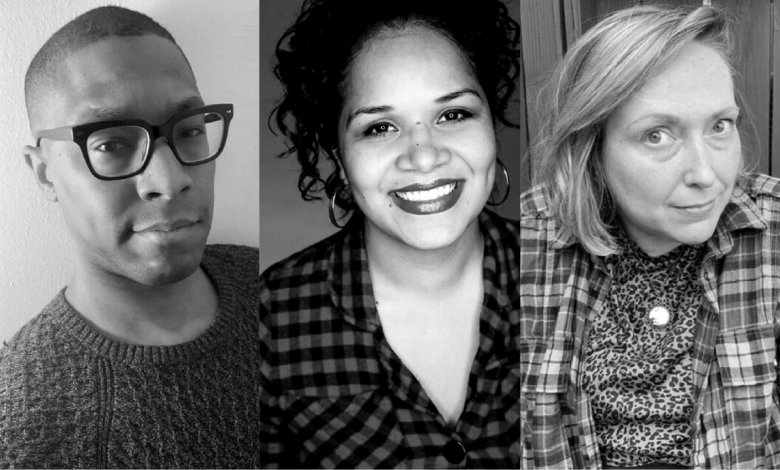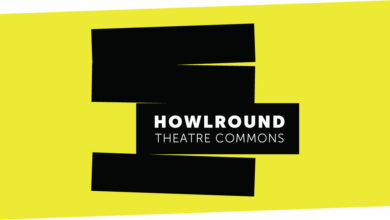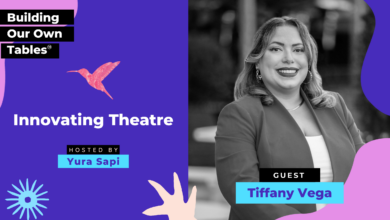The Importance of Community for Playwrights

Not long after I met Alexis, I ran into artist Christin Eve Cato during the Frida Kahlo-inspired immersive piece A Ribbon About A Bomb by ECC, in which small groups of visitors were escorted through a house on Governors Island by three famous female artists from history. Another interactive, visually stunning haunted house fueled by multidisciplinary collaborations that drew young audiences—they sold out several times over.
I already knew Christin from seeing her perform with many Latinx-led organizations all over the city, and I was lucky enough to snatch her up for a play I wrote and directed for the HOT! Festival at Dixon Place in 2017.
I’ve been following her work for the past seven years, and in it there is always an effortless presentation of powerful, compassionate, relatable, and important storytelling that includes a broad scope of topics and characters from a plethora of backgrounds and ages. Recently, she added the word Obie to her resume.
DeVo: I was shocked but not surprised to see you go off to get your MFA for playwriting, you were a star in my book, and I was lucky to have had you for a staged reading. You were so brave and offered so much to that role for my whacky horror play. THANK YOU!!!
I wonder if you miss the stage, from a performance perspective…
Christin Eve Cato: I do miss the stage from time to time, and I still perform. Being an ensemble member with Pregones/PRTT often lends me this outlet. So does the Latinx Playwrights Circle—I often participate in readings of new work. At the moment, I am also exploring the aspects of performing in my own work.
DeVo: That could be cathartic!
Did you go full throttle on writing because you thought there was a gap for you to fill?
We would love to see more programming to support living artists and find innovative presentation methods to attract new audiences.
Christin: I’ve always been a writer. I would say I was a writer before I was an actor. I think what made me go full throttle into writing for theatre was the silencing I kept witnessing. The silence, exclusion, the lack of representation. As a person with a Jesuit education (Fordham), I was taught with an emphasis on the meaning of existence, the importance of archival work, and documentation as a necessary tool for the preservation of history. This is the school I come from, and theatre operates very similarly. Plays are literature. It’s history. As I came to terms with the ways my experience and the lives of so many others have been neglected by the American theatre canon, I felt called to write.
Writing comes very natural to me, and so does acting. However, writing feels easier and more
accessible to me. Quite frankly, I think actors in New York theatre are often overworked and underpaid, which can get really stressful. I think this is one of the main reasons why I want to venture into solo performance. I want to perform on my own terms and hours and just be the kind of performer that I haven’t been able to be yet: absolutely 100 percent me, Cato in the raw.
DeVo: Have you seen any productions recently that have shown some strong examples of how we can decolonize the theatre space?
Christin: I’ve seen great things developing in the Black and Latino theatre spaces. There’s a deeper focus on collaborations and co-productions, and the results have been some really strong and exciting seasons. Like how in spring of 2023, three Afro Latina playwrights had their Off-Broadway debuts (me, Guadalís del Carmen, and Julissa Contreras). Our shows sold out. My play Sancocho and Julissa’s Vámonos were extended twice by popular demand… this is how we decolonize spaces.
DeVo: I’ve been talking with colleagues about how the process of writing has changed so much for a lot of us since the pandemic hit. You are a champion of creating new spaces, which I love. Can you talk a little about “survival” and “rituals” and the way your work has adapted over the past two years? What have you’ve learned? What methods have you shed?
Christin: I think the pandemic also gave many of us the gift of pausing and having time to reflect on the things that needed improvement, art we’ve been dreaming of creating, and significant changes that had to be made. Although the shutdown hurt many artists financially and emotionally (physically as well), many of us had no place else to turn except inwards. This was the survival. This place of stillness is where creativity and inner strength is found. I think the practice of intentionally taking a pause is extremely important and essential for the creative mind.



